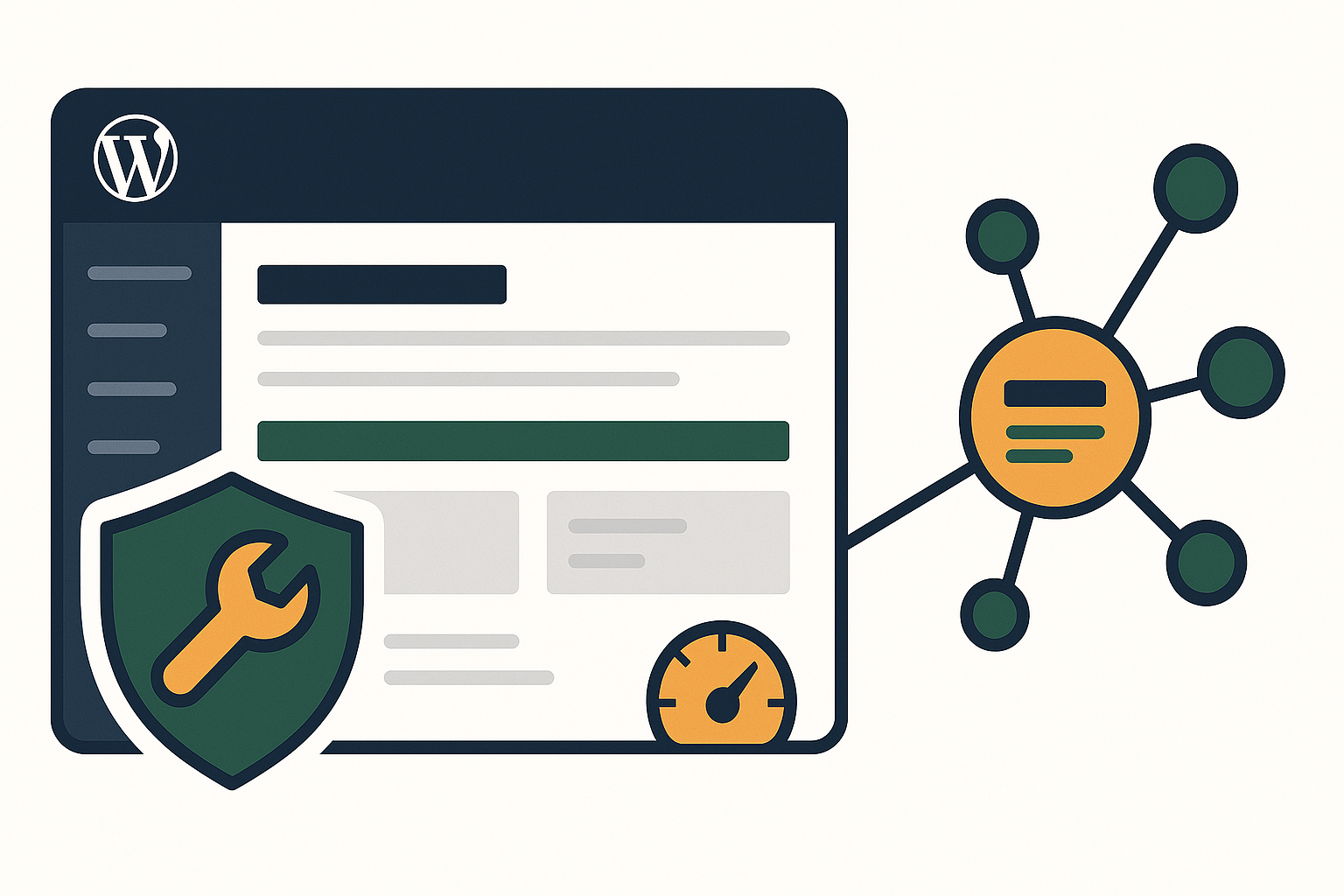WordPress runs a massive slice of the internet. It powers roughly 43% of all websites today and holds around 60% of the known CMS market. That makes it the default choice for small businesses, creators, and even big brands. It's flexible, familiar, and with plugins you can add almost any feature without custom code.
But that popularity creates real problems. More sites mean more targets. Most WordPress security issues don't come from WordPress core—they come from plugins and themes. Outdated software invites attacks. Conflicting plugins break pages. Poor hosting slows things down. Backups get ignored until a bad day. SEO and accessibility fall through the cracks. Over time, even a simple site turns fragile.
This is why website management exists. Your website is a living system that needs routine care to stay fast, safe, and useful.
CMS Market Share: WordPress Dominance
| CMS | Market Share |
|---|---|
| WordPress | 43.0% |
| Shopify | 4.0% |
| Wix | 2.5% |
| Squarespace | 2.2% |
| Joomla | 1.7% |
| Drupal | 1.1% |
| Other | 45.5% |
Source: W3Techs CMS Usage Statistics
WordPress's market dominance means it's both the most flexible platform and the most targeted. This makes ongoing management not just helpful—it's essential.
What Website Management Actually Includes
Management is the boring, important work that keeps the lights on:
Updates: Core, plugins, themes, and PHP—applied on a schedule with rollbacks if something breaks.
Security: Firewalls, hardening, malware scans, and least-privilege user access.
Backups: Daily off-site copies with point-in-time restores and regular test restores.
Performance: Caching, image compression, database cleanup, and plugin audits to cut bloat.
Uptime & incident response: Alerts when the site is down and a plan to fix it fast.
QA & accessibility: Visual checks after updates, link checks, and basic WCAG & mobile checks.
Content support: Small edits, redirects, and new pages staged before going live.
Reporting: What changed, what broke, what we fixed, and what's next.
Common WordPress Issues We Fix (All the Time)
Plugin conflicts: Two plugins try to do the same thing and clash. We isolate the issue in staging and ship a safe fix.
Out-of-date software: Missed updates create known holes. We patch and harden.
Broken links and redirects: Users and search engines hit dead ends. We repair paths and keep link equity flowing.
Slow pages: Heavy themes, unoptimized images, and too many scripts drag speed. We tune, defer, and trim.
Vulnerable add-ons: A single plugin can expose the whole site. We watch advisories and update quickly.
Messy hosting: PHP versions, cron jobs, and SSL need care. We keep the stack clean.
No backups: If you can't restore fast, you're one incident from offline. We fix that first.
How Pragmatic Bear Handles WordPress Management
We're your calm, ongoing partner for WordPress care. Here's what our management plans include:
Safe updates with rollback: Scheduled, tested, and staged on a clone before production.
Security hardening + monitoring: Firewall rules, brute-force protection, and alerting.
Daily off-site backups: 30–90 days retention, quick restores, and disaster playbooks.
Speed tuning: Caching layers, media optimization, and database cleanups.
Uptime monitoring: 24/7 pings with human follow-up.
Technical SEO basics: Schema, sitemaps, redirects, and core Web Vitals checks.
Monthly report: Clear, human summary and next steps.
Our Flagship Tool: LinkSentinel
Internal links are your site's circulatory system. When they break, your users fall off and your content gets buried. LinkSentinel, our in-house WordPress plugin, monitors internal link health so you don't have to.
What LinkSentinel does:
- Finds broken and redirected internal links
- Flags orphaned pages and deep click-depth content
- Spots redirect loops and patterns that waste crawl budget
- Gives a simple to-fix list and a weekly score so you can see progress
Add it to a management plan or run it as a focused audit. LinkSentinel is included with Grizzly and Polar plans for WordPress sites.
Why This Matters for Your Business
A slow or broken site costs trust, leads, and rankings. A secure and fast site earns repeat visits and better conversions. When someone clicks an ad or a link in Google, they should land on a page that loads fast, reads clean, and keeps them moving. That's what management protects.
A Quick Self-Check
If you answer "no" to any of these, it's time to tighten things up:
- Do you have automatic, off-site backups you've tested in the last 90 days?
- Are core and plugins updated at least weekly, with a staging site to test first?
- Is your site passing Core Web Vitals on mobile?
- Do you have uptime alerts that reach a human, not just a dashboard?
- Are admin accounts limited and protected with 2FA?
- Are internal links scanned for breaks and long redirect chains?
What You'll Get with Pragmatic Bear
Fewer surprises: We prevent most problems and respond fast to the rest.
A faster site: Users stay longer and bounce less.
Better crawl paths: Clean internal links and sitemaps help your content get found.
A single point of contact: One team, clear reports, predictable cost.
Ready to Take This Off Your Plate?
You run your business. We'll run the site. Start with a simple WordPress tune-up or jump into a monthly plan. Either way, we'll get your site stable, fast, and easy to manage—and we'll keep it that way.
- Monthly updates & backups
- Security monitoring
- Monthly performance report
- Everything in Cub
- Weekly updates & backups
- LinkSentinel plugin included*
- Performance optimization
- Everything in Grizzly
- Daily monitoring
- Priority support
- Advanced optimization
Sources:
